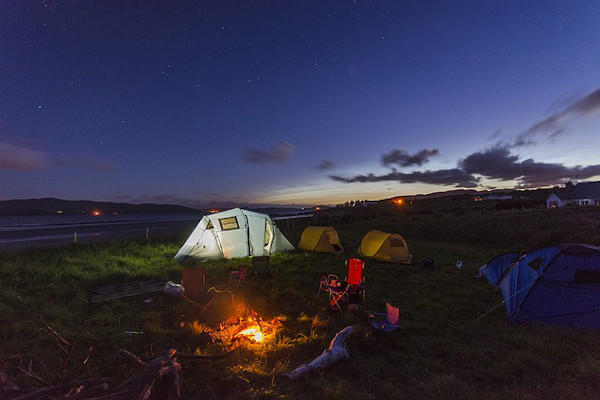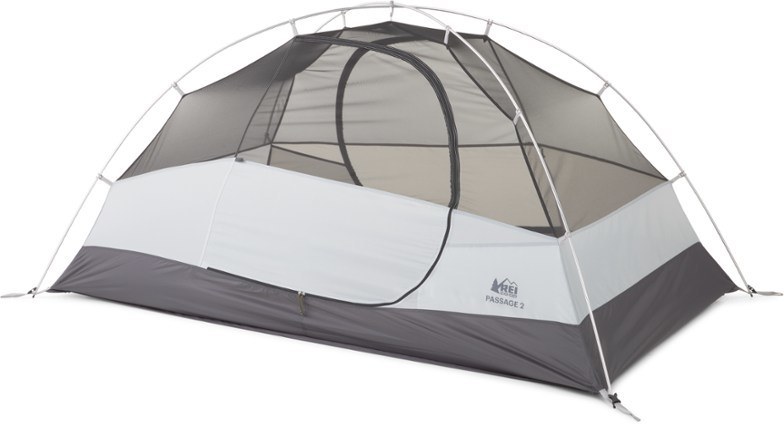When it comes to lightweight tents, watch out for durability and strength. These are usually achieved through innovative pole construction that does not compromise strength and endurance, and maintains a lightness. For a 2-person ultralight tent, go for maximum pack weights of around 3-4 lbs, and trail weights between 2-3 lbs.
Best Ultralight Tents (Top Picks)
Best Overall
Editor's Choice
Best Versatile
This article contains affiliate links. If you buy something through the links on this page, we might get a small commission. It will not affect your price but helps keep our site alive!
Top Ultralight Tents (Detailed Reviews)
We reviewed over 13 ultralight tents for this article. Below are the best ultralight tents that made our short list.
- Big Agnes Copper Spur HV - Best Overall
- Hyke & Byke Yosemite Tent - Editor's Choice
- MSR Hubba Hubba - Best Versatile
- Nemo Hornet Ultralight Backpacking Tent
- REI Co-op Passage 2
Read our complete buyers guide for ultralight tents.
Best Overall Ultralight Tents
1. Big Agnes Copper Spur HV
At just over 2.12 lbs (for the two-person tent), the Big Agnes Copper Spur tent is a brilliant lightweight backpacking tent.
The tent comes with two doors and dual vestibules that give one a combined area of 29 square feet.
The design includes a double-walled structure for great insulation that doesn't compromise breathability, making it one of the best 3-season tents in it's weight category. And if you happen to be a little taller than average you will definitely appreciate the pole architecture, which is steeper than a standard backpacking tent, and therefore creates a roomier space that is easier to stand in.
Finally, for those who hate the finicky process of pitching a tent. Fear not, the Copper Spur is by far one of the easiest tents to pitch.
Check Prices
Main Features
What we like
What we dislike
Key Takeaway
The Big Agnes Copper Spur tent is a fantastic lightweight tent great insulation, good breathability, space and comfort.
2. Hyke & Byke Yosemite Tent 2, 3 Seasons
Hyke & Byke Yosemite Tent stands out for its two-person design, and three-season use, but its best suited for warmer weather.
The partial fly cover built into the design of this tent offers campers great ventilation in warmer climates. The construction of the welded zipper flap makes the tent lighter in comparison with tents that have a sewn flap. There is also ample storage space available inside the tent.
The tent is relatively simple to set and includes popular featherlight poles made of aluminium. These poles integrate lightness and strength into its design, making it a great lightweight tent.
The taped seams and welded corners make the tent durable and a good performer in wet weather too. The tent has two vestibules, adding to the storage capacity of the tent, making the livability of the tent all the more appealing.
Main Features
What we like
What we dislike
Key Takeaway
Best suited for two people, the Hyke & Byke Yosemite Tent works best in warmer conditions and is designed to be light without compromising on strength.
3. MSR Hubba Hubba NX
The MSR Hubba Hubba is know for great ventilation, solid weather resistance and with the 30 denier floor its durability is top notch.
Although the Hubba Hubba is a little heavier than the other tents featured in this review, the additional weight is offset by the great versatility offered. For example, there is a roll-up vestibule canopy for stargazing or warm nights, as well as two large vestibules measuring 8.75-square-feet on each side of the 2-door tent.
The Easton Syclone pole encapsulated in the product gives the tent more stability during windy periods and there is an increase in the tent’s waterproofing, keeping you dry in the wetter conditions.
Finally, like the Big Agnes, the Hubba Hubba features a relatively simple hub and pole set up system for easy pitching and peak interior height of 39 inches.
Check Prices
Main Features
What we like
What we dislike
Key Takeaway
The MSR Hubba Hubba has an open-mesh design and significant vertical wall space to provide you with an evening view and enjoyable living space.
4. Nemo Hornet Ultralight Backpacking Tent
The Nemo Hornet Tent is probably one of the only 2-person tents on the market that weighs less than 2lb. However, it must be said that the tent is best for individual use as it is a tight fit for two backpackers.
This is particularly true when it comes to getting in and out of the tent - the slanted walls of the design limit the interior for two people but provide good access for one person.
Despite it's tight squeeze though, the design boasts two doors and vestibules and has additional space at one’s head and feet making the interior quite spacious and livable once inside. The double wall construction prevents rain from ruining your stay and condensation from building up in the tent.
If you looking for a super lightweight tent and aren't too bothered about space, then the Nemo Hornet ticks the box.
Check Prices
Main Features
What we like
What we dislike
Key Takeaway
Although the Nemo Hornet is marketed as a two person tent, it is best suited for individual use. It is no doubt super light though and worth considering if weight is a big factor on your next trip!
5. REI Co-op Passage 2
The REI Co-Op Passage may not be the lightest tent in our review, but it is by far the best budget-friendly option.
The Passage is a classic 2-person tent that offers 31.1 sq. ft space in the interior.
The design is effective and the balance between budget and function gives backpackers an affordable lightweight option. It is also a strong tent with user-friendly zippers and a comfortable layout.
If you have a tight budget but don't want to compromise on quality then we highly recommend the REI Passage.
Main Features
What we like
What we dislike
Key Takeaway
Although the Passage tent is suitable for a two-person backpacking trip, it does however weigh a bit more than the other tents we reviewed. That being said, the great price tag makes it very appealing to budget conscious buyers.
Ultralight Tent Buyer's Guide
A number of considerations provide buyers with some handy criteria on what to look out for and what these tents have to offer and why.
Weight
Lightweight tents allow hiking and backpacking to be enjoyable without cumbersome, bulky equipment and gear getting in the way.
The risk with light tents though is durability and strength.
One way manufacturers have got around issues of long-term performance is through innovative pole construction that does not compromise strength and endurance, and maintains a lightness.
For a 2-person ultralight tent we recommend looking out for maximum pack weights of around 3-4 lbs, and trail weights between 2-3 lbs.
Livability
A peculiar sounding word but an important principle nonetheless. Understood to be: the ease of access into the tent, the interior space for storage, the sleeping arrangement and its weather-resistance.
Many of the tents mentioned above have a double-wall construction that is the calm in the storm, keeping the rain away.
Sacrificing a weather resistant design may save you some money but cost you your comfort and even safety, so make sure you know what it is you’re investing in.
Two-person tents provide a balance between weight and interior space that is often in short supply with solo setups.
Free-standing designs also make the tent experience more livable because one can easily adjust the position of the tent because the canopy can stand on its own. Moreover, one does not need to struggle with stakes meeting unforgiving terrain.
Durability
A tent’s weight is explained in Denier (D) and the higher the number the heavier the fabric and vice versa.
In the tents mentioned above, the numbers are relatively low, at: 20D and 15D this is attributed to the category of the best lightweight tents available.
The nylon that is used in the makeup of these tents manages well against abrasion, is light and the fabric is tough.
Polyester that is used in the construction of some tents is resistant to damage via Ultraviolet Rays.
Due to the lightweight materials used in the design of these tents they are not cut-out for hikers who are tough on gear, but they go the extra mile if taken care of.
The material may be sensitive to the roughest of terrain but they are known to resist the stormy nights and endure the wet weather to keep you dry and warm. The use of silicon coating adds to the capacity that these tents have to be waterproof.
Construction
The wall construction that boasts double lining satisfies the need for a safe interior.
The near-vertical wall set-ups of a few of these options gives you that wiggle and stretch room, increasing your comfort levels during your stay.
The mesh panels that one would come to find in these tents assist with managing and regulating the condensation levels in the tents and thus maintains good ventilation.
It is helpful to note that a tent with good bug protection ensures that you’re not camping out with some unwanted critters.
The doors provide separate entrances - no treading on a friend in the awkward hours of the morning. The inclusion of vestibules into the design ensure that you have a safe dry space to store goods that you would not want in your direct living space, which makes access all the more convenient.
Many of the streamlined designs mean that the set-up of these tents are relatively simple and makes the ease of use quite enjoyable.
Continue browsing
See more outdoor gear reviews and our detailed camping tent guide. Or check out these reviews:






